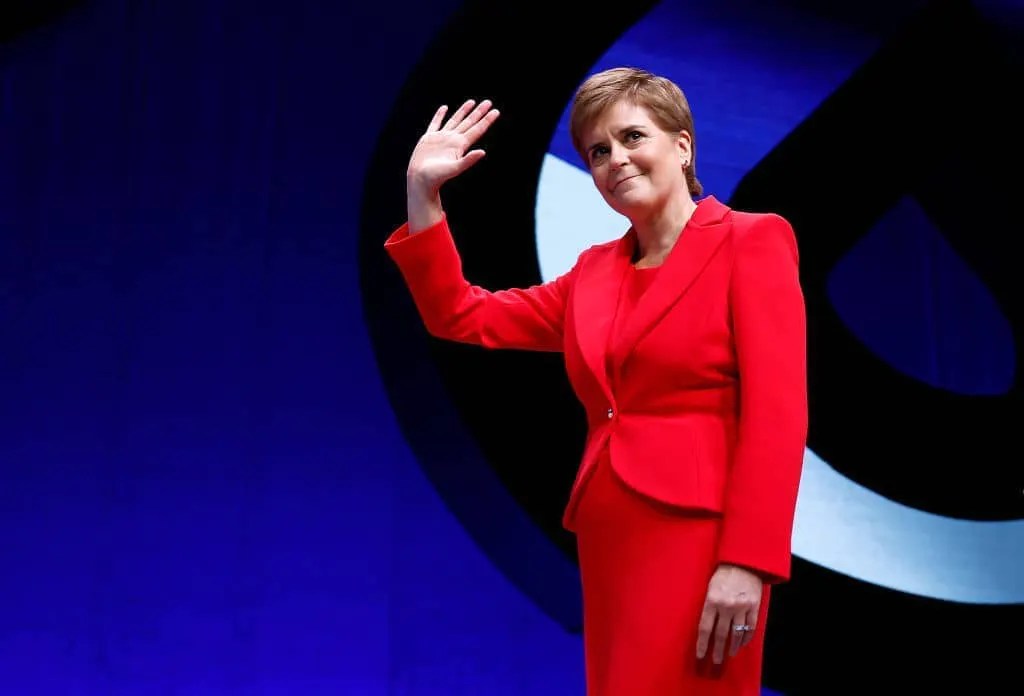The First Minister could not have been clearer. Asked about the possibility of Scotland joining the euro, she said Scotland ‘would not qualify’. ‘I don’t think it is the right option for Scotland,’ she added.
The question was put to her earlier this month at a press conference where she presented her new paper on the economic case for Scotland exiting the UK. It was a significant statement, because new entrants to the European Union must commit to adopting the euro. ‘All EU member states, except Denmark, are required to adopt the euro and join the euro area,’ says the European Commission.
Unsurprisingly, senior officials in Brussels were not impressed. Speaking on an unnamed basis (EU officials will not allow themselves to be seen to be interfering in UK internal matters), one source said explicitly, ‘No euro, no membership’, according to the Times.
This then led to the First Minister, speaking in the Scottish parliament, seeking to undermine the claims made by the EU officials. She stated that many countries in the European Union use their own currency, and quoted a number of sources, including an ex-president of the European Commission, in the past describing how the euro is not forced on countries.
Yet the consensus today is that member states will be more strictly opposed to new applicants who reject the single currency. And it is significant that no country has joined the EU while explicitly refusing to commit in principle to the euro.
Senior officials in Brussels were not impressed
It is easy to see why the First Minister is reluctant to provide such a commitment. A 2021 poll found that almost 40 per cent of Scots are less likely to back independence if it puts the country on a course to adopting the euro. The EU might be popular with Scots. Being in the eurozone is not.
In its white paper on the economics of independence, the Scottish government is clear that its central case for secession now rests on the argument that joining the EU is the key to Scotland’s future prosperity. Sturgeon aims to frame any future referendum not only as a choice about being inside or outside the UK, but ultimately also one of being inside or outside the EU.
When the 2014 referendum took place, there was no strong link between voters’ attitudes towards the EU and their attitudes towards independence. As shown by the political scientist and polling expert Professor John Curtice, this changed after the Brexit referendum. The pro independence vote now strongly correlates with anti-Brexit sentiment. This, together with the polling on euro popularity, likely at least partly explains Sturgeon’s differing positions on the EU and the eurozone.
Perhaps more significant is the difficulty in pitching to Scots the necessity of transitioning between four different currency arrangements in coming years. The steps involved in adopting the euro would entail leaving the official sterling zone to a system of unofficially using the pound known as sterlingisation. From there, the country would have to transition to a brand new currency. That would then put Scotland in a position where it could enter the Exchange Rate Mechanism (ERM II), which is a crucial milestone in adopting the euro. Only then could adoption of the euro happen.
All steps are technically challenging and come with risks. The move to sterlingisation alone would be an extraordinary economic experiment for an advanced country.
The First Minister could be honest and tell people in Scotland that independence is either not a realistic route back into the EU, or that the only way back is to accept the euro and so commit to a precarious path to its adoption. Instead, she is pitching a fantasy where Scotland will be welcomed into the club, while picking and choosing which of the club’s rules to follow.
It seems more than likely that the prospect of an independent Scotland’s EU entry is merely being used by the SNP to secure separation from the UK, with no real future membership intent. It is a position that must be building up resentment in Brussels among those who previously bought into the party’s ‘leave a light on for Scotland’ paradiplomacy, which was always a cynical attempt to exploit Brexit for pro-separatist purposes. It should also be building resentment among the Scottish electorate, who are being taken for fools.
The First Minister has tied herself in knots trying to maintain support for independence while not committing wholeheartedly to the EU. She has sent a strong signal to Brussels that she is willing to disregard not only the letter of EU accession rules, but also the spirit of the Union itself.
That will be remembered. The EU is the great anti-nationalist project of the post-war era. The SNP’s fetishism for sovereignty has never fitted with its founding principles. It is only right then that the First Minister and her colleague’s shifty manoeuvres around euro adoption are finally revealing the mendacity of their professed love for Europe.






Comments